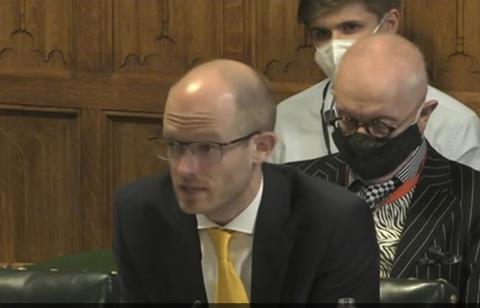Senior civil servant tells MPs Government is “very clear” the cost of mid-rise building repairs will come from the industry
A senior civil servant has indicated the government could expand existing plans for a building safety levy if negotiations with housebuilders fail to raise enough to pay for fire safety repairs to mid-rise blocks in England with unsafe cladding.

Richard Goodman, director general of building safety at the Department of Levelling Up, Housing and Communities (DLUHC), told MPs the “openendedness” of the levy depended on the industry’s response to the government’s call for it to stump up £4bn voluntarily.
He explained the government will not firm up the levy’s scope until it knows “what the development sector is going to do in terms of its voluntary solution”. He also said the housing department was looking at the responses to the consultation on the levy, which closed in October last year.
The original intention for the Building Safety Levy was for it to be paid when developers wanted permission to build high-rise buildings. However, the department is now looking to change the scope of the levy to allow it to be charged against all residential permissions by amending the Building Safety Bill.
Chair of the Levelling Up, Housing and Communities select committee Clive Betts asked: “You are saying if the industry doesn’t respond favourably on a voluntary basis then the levy will be extended to raise more than initially intended?”
Goodman said: “All I’m saying here today is the department is very clear the remainder of the cost for building safety will come from the industry and the department will take powers it needs in order to make that happen should that be necessary, which we hope it won’t be.”
Gove has already threatened to remove funding and stop developers from trading if developers don’t pay into the £4bn fund to remediate mid-rise blocks (11 to 18 metres high). The largest housebuilders were given until early this month to agree to contribute to it.
Chris Warenius, legal director at law firm Harold Benjamin, has called Gove’s amendments to the bill “draconian” and “extreme”.
Goodman’s warning comes after Housing Today reported on Monday that housing secretary Michael Gove said he was “disappointed” housebuilders had not come forward with a fully-funded remediation plan to fix fire safety issues in tower blocks.
He wrote to the Home Builders Federation calling for developers to work with officials and come up with an agreed plan by the end of March. Gove stated he expected developers “to make public commitments”.
Goodman also confirmed to the committee that the government wanted the whole housebuilding industry to share the cost of remediating mid-rise blocks where the owner or freeholder can not be found.
He told MPs it was an “inescapable reality” that “there will be an increased burden on the sector as a whole with those orphaned buildings.”
The phrase ‘orphaned buildings’ refers to those where repairs are needed but where the owners or original developers cannot be traced to pay for repairs, often because they are abroad.
Committee member Conservative Bob Blackman said he was concerned that freeholders and developers who “got on with the job” of remediating cladding would pay for their own buildings but also “get penalised for those who haven’t done it”. He was worried this would discourage companies from removing cladding in the future because of this “double whammy”.
See also>> Can Gove really ‘go after’ develeopers for £4bn of cladding costs?
See also>> ‘Disappointed’ Gove renews cladding law threat to housebuilders
But Goodman said that in order to protect leaseholders, he needed to work out “what is the most equitable way of distributing the burden of dealing with those orphaned buildings across the remainder of the industry?”
He added: “I’d love to be able to create a mechanism where only the polluter [individual or organisation that has not done the remedial work] has to pay. That is not going to be possible. What we are looking for is the most equitable distribution across the industry as a whole where there are those orphaned buildings.”
During the session Goodman was keen to point out developers not doing their bit to pay for and remediate unsafe buildings would be “very brave”, explaining the department was “keen to push enforcement action wherever that is possible.”
The government is also expecting about £2bn to be raised over the next 10 years from the industry for unsafe cladding on blocks between 11 and 18 metres high from the residential property developer tax, which is coming in from the 1 April and will be at a rate of 4% on developer profits exceeding £25m.
The Treasury has pledged £5.1m for all the necessary remedial works on high-rise blocks in England. Jeremy Pocklington, permanent secretary at the housing department, told MPs at the committee meeting yesterday he thought this money would be “sufficient” to do the job of remediating high-rises.











No comments yet